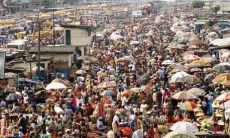
Email: ZYVC057@live.rhul.ac.uk
Total Article : 213
About Me:I'm a graduate student studying International Criminal Law and first started writing for King's News almost 4 years ago! My hobbies include reading, travelling and charity work. I cover many categories but my favourite articles to write are about mysteries of the ancient world, interesting places to visit, the Italian language and animals!

Boasting both the largest economy in Africa and some of the most picturesque view in the world, The Federal Republic of Nigeria is a rapidly developing country yet its importance is largely understated in global media. The nation, situated in West Africa, has been plagued by a series of military coups since being granted independence in 1960.
Nigeria's Federal Republic resembles that of the USA, with the executive power exercised by the President, and is further influenced by the Westminster Parliamentary model due to the structure of its upper and lower chambers of parliament. The President, whose power is monitored both by the Senate and the House of Representatives, is elected every four years. The former British colony, which is deeply embedded in a history of political assassinations, military oppression and ethnic violence, now seeks to hold fair elections. Nigeria is afflicted by prebendalism and political corruption which are both dominant throughout Africa. The nation’s capital, Abuja, has been subject to violent attacks including the 2014 bombing for which Boko Horam claimed responsibility. The current President Goodluck Jonathan, a Christian from the South, was sworn in after the death of former President Yar’Adu and was then elected President in 2011. The media coverage in Nigeria is one of the most active in Africa, the radio and television are the mainstream means of obtaining information although youth are gaining more interest in the internet. Despite current attacks on Nigerian journalists and Reporters Without Borders (RSF) ranking Nigeria 126th out of 179 countries in 2012 in regards to its freedom of press, news of the upcoming Nigerian elections has dominated the media worldwide.
Often referred to as the ‘Giant of Africa’, Nigeria’s population is estimated at some 174million people with one of the largest groups of youth in the world and is the most inhabited nation in Africa. Nigeria’s economy has drastically increased in recent years. Last year, Nigeria’s economy rose to being worth over $500billion, surpassing that of South Africa, and became the world’s 21st largest economy. According to Yemi Kale, head of the National Bureau of Statistics (NBS) its economy has risen by 89% compared to 2013 which exceeded even the highest expectations of analysts who estimated it to rise between 40% and 60%. Oil plays an essential role in the economic boom Nigeria has been subject to and the nation is the twelfth largest producer of Petrolium in the world. Other areas of Nigeria have also relished success recently, in particular Nollywood – the Nigerian film industry – which has contributed 1.4% to the economy. The rapid economic surge in Nigeria is outstanding: just two decades ago the state had one telecom operator with approximately 300,000 telephone lines, now there are almost a dozen operators working for Nigeria’s 120million mobile phone users. Nigeria merits global attention as the World Bank considered the nation to be a ‘merging market’ and it is predicted to become the world’s 20th largest economy by 2050. Nonetheless, the news of progress is bitter sweet as the majority of Nigerians continue to live on less than a dollar a day and in regards to infrastructure or governance it is still behind South Africa, which is the only African nation to be part of the G20.

The sheer diversity of the nation is incredible with it hosting over 500 different ethnic groups, the largest of which are the Hausa, Igbo and Yoruba, each of which are spoken languages along with Nigeria’s official language, English. They also have their own religious sects though they are practised only by a minority. It is religion which ultimately paves a great divide through the heart of the nation with the majority of Christians living in the South and Muslims in the North and the full effects of this have been realised by extremist groups, particularly al-Queada’s ally Boko Horam. In recent years their goal of an Islamic Caliphate in Nigeria has found a greater following and this year they have become bolder still, threatening to attack Lagos – the most populous city in Nigeria - and leading skirmishes into neighbouring countries Cambodia and Niger. They even forced the use of Nigerian Air Force planes to repel their Valentine’s Day attack on the city of Gombe in North Eastern Nigeria.
Note: This article, written by myself, was also published on the Politics Made Public Magazine and can be found on their website.
Image 1: http://www.eurweb.com/wp-content/uploads/2015/04/i-luv-nigeria.jpg
Image 2: http://static.guim.co.uk/sys-images/Guardian/Pix/pictures/2012/9/10/1347300037654/Crowded-Oshodi-Market-in--008.jpg

0 Comment:
Be the first one to comment on this article.